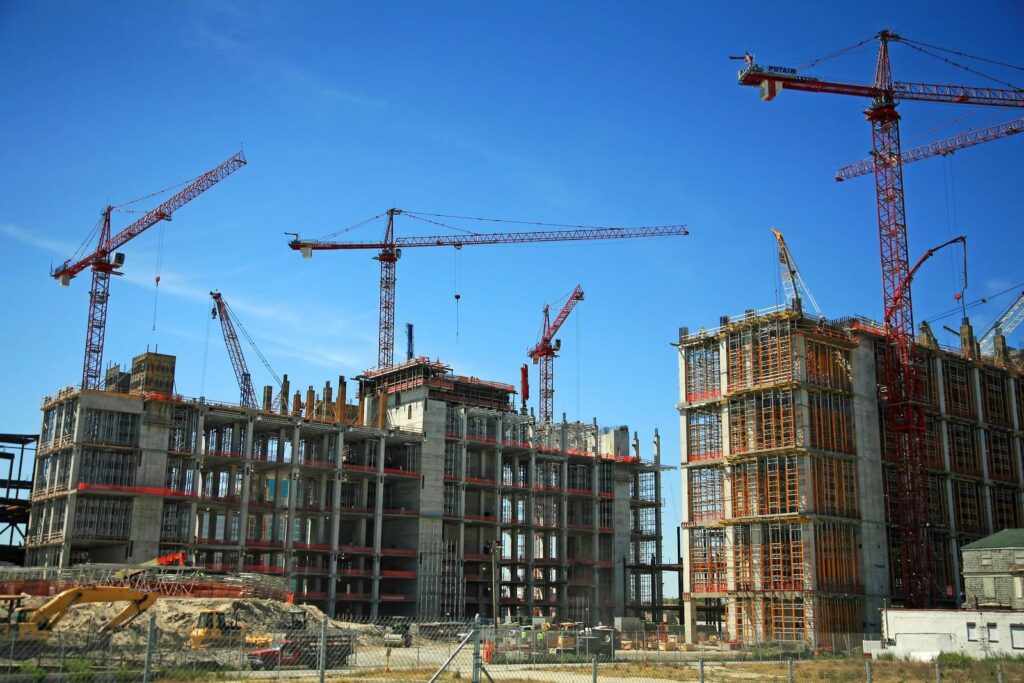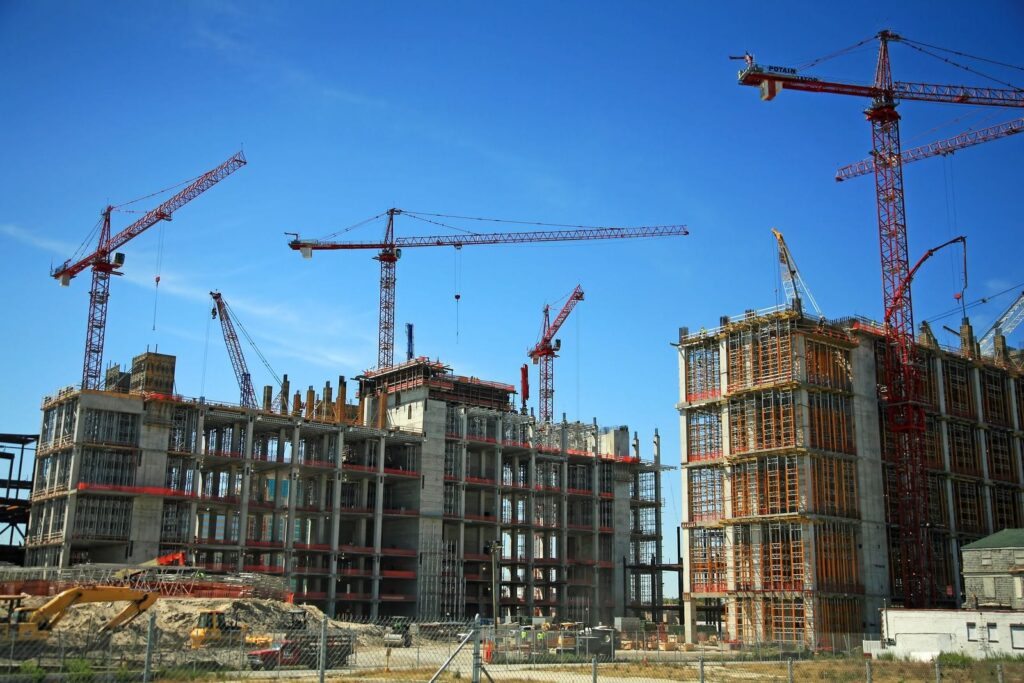Successful commercial real estate developers may amass significant wealth. Consequently, prospective investors often inquire about our team’s development method. People are particularly interested in real estate development enterprises. How do they function? How do they operate? This article will offer an overview of real estate development corporations, addressing a common concern among investors.
Specifically, the following themes will be discussed:
- What is property development?
- `Overview of a Real Estate Development Company
- Final Reflections
What Is Property Development?
Overview
Real estate development is the improvement of either undeveloped land or existing buildings. These enhancements are used by developers to boost the value of a property. Depending on the specific transaction, real estate developers may prioritize ground-up construction, historic rehabilitation, or value-added enhancements.
For instance, one transaction may begin with a plot of undeveloped property. A real estate developer may examine this site, prepare a plan for transforming it into a series of townhouses, determine how to fund the building of these dwellings, get municipal permission for the necessary permits, and then manage the construction of these townhomes. This developer might continue to lease the houses for rental revenue or sell them to a real estate investor after development is complete.
Regardless of strategy, real estate developers prioritize the financial aspects of a transaction. A prosperous developer would evaluate a proposed transaction to guarantee that future revenues will cover the total development expenditures. If the return on investment is insufficient, the developer will either modify the deal’s terms or abandon it.
Real Estate Development vs. Construction
Construction and real estate development are tightly intertwined. However, they are not identical. Construction requires hammers and nails, but developers must find out how to pay for those hammers and nails.
In other words, real estate developers combine the roles of senior strategist and project manager. They establish a vision for a real estate project, determine how to fund it, and then supervise its day-to-day execution to realize that goal. In contrast, construction experts (general contractors, or GCs) concentrate on the project’s actual construction.
Real Estate Development Requirements
Real estate development promises lucrative returns, but it does not imply that everyone should do it. Instead, good developers exhibit the following traits:
Experience and Acceptance of Risk.
Construction endeavors are fraught with danger. Extensive expertise is required to mitigate this risk and complete a development effectively. Developers must comprehend and oversee activities relating to, among other things, commercial finance, municipal zoning, building, design, accounting, and the law. Developers may not be specialists in these subjects, but they must have the experience to comprehend how they fit into the larger project.
Access to Capital
Developers must frequently invest tens or even hundreds of thousands of dollars in feasibility studies and planning before obtaining municipal clearance for a transaction. Moreover, developers often bear these expenditures independently and do not seek outside investors until they have secured local government clearance. Once permission is granted, commercial development projects are far more expensive than residential construction. Most ventures cost millions of dollars (or more), from soft expenses to hard expenditures to holding costs. Without access to substantial finance, developers cannot consummate transactions.
Overview of a Real Estate Development Company
What exactly is a real estate development firm?
A real estate development firm is a corporate organization whose primary emphasis is the development of real estate. In other words, these businesses create income by locating and developing real estate.
Many development businesses charge a development fee for their services, often a percentage of overall project expenditures. When these enterprises intend to sell properties after development, they may also be eligible for an incentive fee if the returns are above a particular level. Some development businesses also function as a property and/or asset managers, earning a fee for maintaining stabilized properties.
In addition, real estate development enterprises can generate indirect profits for their proprietors. In many instances, the proprietors of a development firm are also the owners of the properties they develop. These people gain rental income and sale proceeds from the properties they create, although via a different organization.
Numerous real estate development firms specialize in a particular approach (e.g., ground-up construction, value-added purchases, etc.) and property type (e.g., multifamily, office, etc.). However, some individuals chase excellent bargains regardless of technique or style.
Real estate development firms are businesses, which means they must adhere to the same standards as all other enterprises. For instance, development organizations must address optimal legal frameworks, tax considerations and planning, insurance requirements, office management, accounting, and human resources. The fact that development businesses are focused on real estate does not exempt them from these fundamental business duties.
Can Developers Also Serve As General Contractors?
Yes, many real estate developers are also general contractors, albeit they usually operate as different businesses. For instance, Bill and Ann may own the real estate development business B&A Development Company, LLC. Nevertheless, they are both licensed contractors. Consequently, they form B&A Construction, LLC, and the general contractor for all development entity’s projects. This implies that as principals, Bill and Ann will eventually get both the developer and general contractor’s fees.
Common Real Estate Development Company Contractual Organization
There are many ways to structure a single transaction, depending on the circumstances. However, for demonstrative purposes, the following transaction structure is reasonably typical:
Real Estate Entity:
This is the legal entity holding the title to the real estate (e.g., 123 Main Street, LLC).
Principals/Member Managing Entity:
This is the legal organization in which the principals, such as Bill and Ann, own a direct ownership stake (e.g., 123 Main Street Managing Member, LLC). This entity owns a proportional share of the property entity.
Investment Participant Entity:
If the development needs extra funds beyond those provided by the deal’s founders (e.g., Ann and Bill), the development firm will seek new investment members. This may be a person or distinct entity (e.g., Multifamily Investments, LLC). Additionally, this investing member owns a portion of the property company.
Creating Entity:
The developer company (such as B&A Development Company, LLC) is responsible for locating, financing, and overseeing all parts of 123 Main Street, LLC transactions. This entity typically has no equity participation in the property entity for liability purposes. Instead, it receives money for its development services without participating in the company’s ownership.
Lender:
The lender provides debt finance for the transaction by granting 123 Main Street, LLC a loan directly. With debt financing, the lender does not technically own a piece of the property (though it will put a lien on the possessions while the loan is due). The development company’s responsibility (e.g., B&A Development Company) is to get the actual financing.
General Contractor:
The general contractor is responsible for overseeing and paying all subcontractors. The developer will guarantee that the GC is paid as development advances, although the payments to the GC will likely come from the property entity and its construction loan.
Final Reflections
The preceding article provides an overview of real estate development firms. Launching a successful business requires extensive expertise, willingness to take risks, and access to finance. Fortunately, you may have access to development offers by investing with reputable development firms like ours.
******************************
Come join us! Email me at mark@dolphinpi.us to find out more about our next real estate investment.



